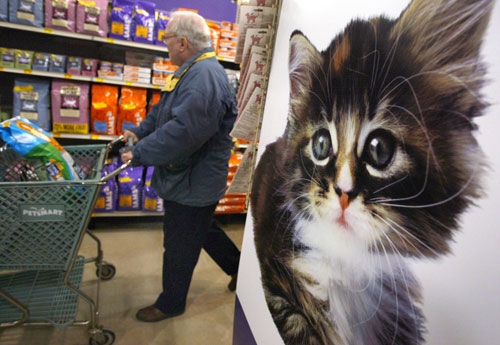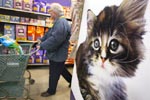Man with a passion for pet food
Updated: 2011-12-08 16:31
By Raymond Zhou (China Daily)
|
|||||||||||
Responsibility
The community outreach programs have also discovered that pet ownership in China is "slightly skewed toward an older profile". Pet owners tend to have children and tend to live in slightly bigger buildings, which, Andrews adds, is the same around the world. Also, the more developed a city is, the higher the use of pet food. Currently, Mars is in 60 of the top cities in China but, Andrews predicts, this number will shoot up to 300 over the next few years.
|
 |
|
A customer shops for cat food as he passes a photo of a kitten in a supermarket in Niles, Illinois.[Photo/China Daily] |
Mars will differentiate and treat every province and every city separately, he says. "China is too big in geography. Every city and region must have a different sales strategy and operational method," which will be more complicated to operate, but necessary.
A higher rate of pet ownership will eventually benefit Mars, but Mars does not take a "the more the better" approach. Instead, the first piece of advice Andrews and his staff will offer a potential pet owner is responsibility: "Fundamentally, you should own a dog or a cat only when you are ready to own the dog or cat for life."
That is a big commitment for anyone, but it is part of the responsible pet ownership policy the company advocates. "When you see your pet as a part of your family and not something like an accessory - in the same way as your car or your handbag or your watch might be - that is when responsibility just becomes natural," says Andrews.
Pets that do not go to responsible households do not lead a happy life, he says. That is especially relevant to dogs, which can be dangerous if not trained well. When a dog does not behave, it is the fault of its owner, he says. "People need to be taught how to bring a dog up in the right way, just like a child or yourself."
All Mars people share the same vision of creating a better world for pets. Andrews envisages a growing population of responsible pet owners, which will drive the industry of pet care and pet food. More pets will receive the full treatment of good hygiene, healthy food, prim-and-proper dress and other care issues. As the whole industry grows, Mars will grow with it.
Role model
Mars is not only a manufacturer of products for pets, but aims to set a positive example for pet-human relations in the workplace. While some high-tech companies tout the employee perk of bringing their pets to work, Mars has built a pet-friendly environment that will bring a big smile to any pet lover as soon as he or she steps into its corporate building.
In the Huairou office complex of its China headquarters, in Beijing's northern suburbs, beautiful pictures of employees with their pets line the walls. There is a large dog pen outdoors attached to the building, looking like a small kindergarten. On the second floor is a play area for cats.
Incidentally, the whole office area is not partitioned, except for the cat playroom, with most employees sitting at round tables. Even the general manager does not get a private room. The only "preferential treatment", if it can be so called, is a traditional Chinese screen to his back, and behind that, the vista of the western hills of Beijing, where, on a clear day, you can spot the contours of the Great Wall snaking among them.
At Mars, employees can bring their pets to work every day, says the approachable and engaging general manager.
He recounts the tale of one employee who has rescued many stray dogs and cats and taken them home to care for them.
Mars also organizes an annual event, a corporate party so to speak, for all employees, some with friends, to gather in early autumn on the lawn with their pets. Even colleagues from the chocolate business of the company down the road will come. They exchange tips on pet care just like mothers talking about their babies.
That, according to Andrews, not only boosts employee morale, but also creates a ripple effect that gradually influences a wider circle of society with positive pet-caring habits.
The absence of an office-space hierarchy may trickle down to the way people treat their pets or, conversely, it could be inspired by positive pet-human relations in the first place. "We put a lot of trust in people. We tend to find people who respect that trust and that freedom," says Andrews.
You do not have to be a pet owner to join the company, but if you do not like pets you will probably stay away, he says - or, if you take a special interest in a hierarchical way of operation, for that matter. "We want to find creative people, people who enjoy freedom and want to make a difference, people who do more than just make money."
The passion of Andrews for the pet food business makes it as sexy and appealing as an ambitious start-up in the IT industry, and that is very unusual for a company with a rich history, founded by Frank Mars exactly 100 years ago, in 1911.








